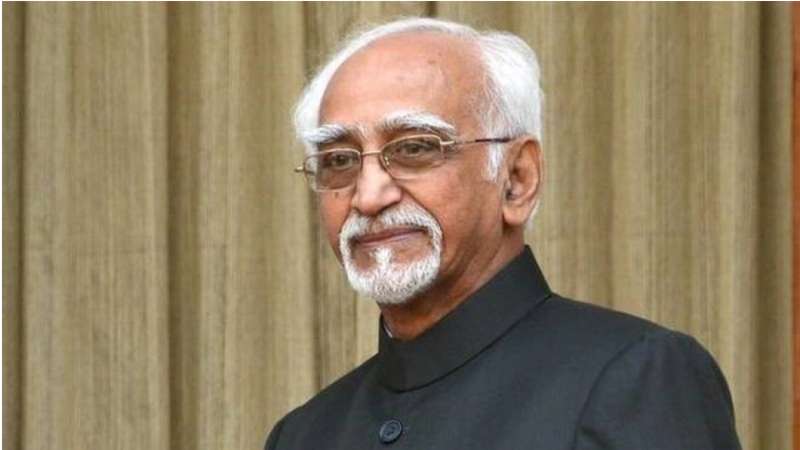
Former Vice President Hamid Ansari has ruffled some feathers. Known for his perceptive remarks on democracy, secularism and human rights, this time he has spoken again. At an international conference organised by the Centre for Research in Rural and Industrial Development, he described nationalism to be an “ideological poison”.
Saying that nationalism is often confused with patriotism, but they differ in meaning and content, he said that many societies have become the “victims of two pandemics” – religiosity and strident nationalism that impacts their behavioural patterns. He said humanity could be saved only if these two pandemics are evaded and replaced by human behaviour in light of collective experience and moral guidance.
In his address at the event on Sikhism founder Guru Nanak Dev’s philosophy “to spread peace, harmony and human happiness”, he said that it weren’t the founders of religious faith who propounded religiosity, but their followers who diluted or corrupted their teachings.
Speaking about Guru Nanak whose 550th birth anniversary is to be celebrated soon, Ansari said that the Sikhism founder advocated brotherhood to all humans, espoused the cause of the downtrodden and advocated what in modern terms could be called ‘interfaith dialogue’.
Evoking the words of other national and international figures he said, “Decades earlier, Rabindranath Tagore had called nationalism ‘a great menace’, describing it as ‘one of the most powerful anaesthetics that man has invented’. He had expressed himself against ‘the idolatry of the nation’. Albert Einstein considered it ‘as infantile disease’.”
Pointing out to how patriotism was both militarily and culturally defensive, he said, “It inspires nobler sentiments but must not be allowed to run amok since in that condition it ‘will trample the very values that the country seeks to defend’.”
Saying how nationalism in its strident form is inseparable from the desire for power, he said, nationalism means identifying oneself with a single nation, placing it beyond good and evil, right or wrong, suspending individual judgment, and recognizing no other duty than that of advancing its perceived interests. And doing so with impunity might lead to unstable and explosive conditions.
Calling both, religious and strident nationalism undesirable, he said that the alternatives to both, the salvation of humanity and human happiness lay in the promotion of peace and harmony through tolerance, dialogue, accommodation and acceptance.
Hamid Ansari: Always a vocal critic of right-wing propounded nationalism
The current speech by Hamid Ansari is not the first time he has expressed his views on the feeling of aggressive nationalism that is slowly engulfing the country.
In his book, “Dare I Question? Reflections on Contemporary Challenges”, a collection of his speeches and writings he says, “In the typology of democracy; ours is a liberal one based on universal suffrage, tolerance, respect for diversity, a comprehensive charter of rights and Rule of Law that brings together the notions of rights, development, governance and justice.
Their attainment is premised on equality and fraternity. Any dilution of this principle will take it in the direction of an ethnic democracy, implicitly or otherwise, and would bring forth an illiberal structure.”
In an interview in 2017 as the outgoing Vice President, he expressed concern about the escalating violence against minorities in the name of cow-protection to a renewed assertion of majoritarian-cultural nationalism. The propensity to be able to assert your nationalism day in and day out was unnecessary, he had said.
He has earlier asserted, “Hyper-nationalism and the closing of the mind is also ‘a manifestation of insecurity about one’s place in the world.”
Right-wing up in arms
It is natural to assume that Hamid Ansari’s statements against the evil spread of nationalism haven’t gone down well with the right-wing nationalistic fascist.
Tearing him and his speech apart on Twitter, Hindutvawadi trolls have come to the rescue of their ideologies against his.
Some of the tweets are below.
#Breaking | Mohammad Hamid Ansari, the former Vice President of India, reignites the nationalism debate by describing nationalism as an ‘ideological poison’.
TIMES NOW’s Mohit Sharma with more details. Listen in. pic.twitter.com/msov52Mbnp
— TIMES NOW (@TimesNow) November 8, 2019
#Nationalism today is often confused with patriotism but they differ in meaning and content, says former vice-president Hamid Ansari.https://t.co/ufqECbNi4e
— The Hindu (@the_hindu) November 7, 2019
#Nationalism today is often confused with patriotism but they differ in meaning and content, says former vice-president Hamid Ansari.https://t.co/ufqECbNi4e
— The Hindu (@the_hindu) November 7, 2019
Hamid Ansari has consistently opposedthe idea of jingoistic nationalism and has said that democracy can become a tyranny if one is not allowed to criticise the government’s policies. Many rabid right-wingers have questioned his appointment as the Vice President of the country in the past. Today, after his speech they’re once again up in arms, guns blazing, ready to question his ‘nationality’.
Related:
Muslims have now become ‘Neo- Dalits’ in Indian Society
Dissent essential in open society: Hamid Ansari
How Hindus and Muslims together built India’s composite culture